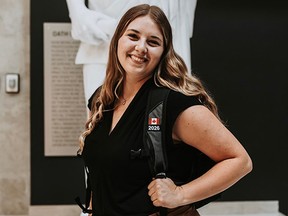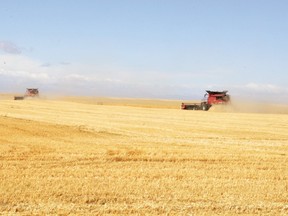
U of C medical students to learn about rural life, medicine Saturday




Medical student to provide classmates with insight into rural life and health care by organizing a full day of learning for them.

Article content
Chatting with classmates, Alyssa Groves realized few of her fellow University of Calgary first-year medical students were from rural communities.
They were from big cities, like Calgary, Edmonton and Toronto, but thought it would be “cool” to see Groves’ family farm near the southern Alberta of Champion, in Vulcan County.
Article content
Groves, determined to provide them with some insight into what rural life and health care are all about, set about organizing a full day of learning for them.
Advertisement 2
Article content
This Saturday, 56 of Groves’s classmates are being bused from the Foothills Medical Center to the Vulcan Community Health Center, where they’ll do some skill-building at various stations with local doctors and nurses and get a look at the facility with community members.
They’ll also be taken to Groves’s family farm, a mostly grain operation but also home to 40 head of cattle, for a tour before going to her dad’s place nearby to see some calves and chickens, as well as learning about different types of grain and examples of products they’re made into. The students will brush up on feedlots, and there will be a panel discussion on understanding rural communities and the people who live in them.
Both the local community and the University of Calgary Cumming School of Medicine, through its Distributed Learning and Rural Initiatives department, have helped Groves organize and pay for this Saturday’s day out.
While Groves hopes to recruit family doctors to practice at Vulcan’s health center, she says the main goal of the trip to Vulcan County is to give the students a better understanding of rural residents, farming and small-town life.
Article content
Advertisement 3
Article content
“At the very least, this is going to help all these people be better doctors to people from rural communities,” says the 22-year-old, who wants to practice medicine in a small town within an hour’s drive of the family farm.
She recalls being peppered by students about calving season while they worked through a case study about a fictional ranching operation.
“They’d never heard of it. “Didn’t know what it was,” says Groves. “But if they can sit down and talk to that patient and understand what calving season and understand the importance, they can provide better care in the future.”
Vulcan needs to recruit students, showing them the benefits of living and working in the community, before they’ve made up their minds where they’re going to practice, says Brenda Findlay, who chairs the Vulcan and County Healthcare Worker Attraction and Retention Committee .
“If any of them show any interest at all, we’re making it easy for them to contact us,” she says.

Adequate housing a hurdle for attracting health care workers to Vulcan County
Housing new health-care professionals is one of the biggest obstacles the community currently faces, says Findlay.
Advertisement 4
Article content
“There is no rental housing in Vulcan,” said Findlay, adding a full-time nurse from Saskatchewan working at the health center for six months has been unable to bring his family over because he can’t find a big enough rental house.
“If we don’t find housing for them, we’re not going to keep them for long periods of time.”
The Crowsnest Medical Clinic, in Blairmore, has had success recruiting medical students who spent part of their learning there, says manager Michele Austad.
Physicians there staff the clinic and the town’s Crowsnest Pass Health Centre, which has a 24/7 emergency department. The clinic, with about 5,000 people on its books, is an active teaching clinic, taking medical students and residents from both the universities of Calgary and Alberta. In 2022, it was chosen the best rural education site of the year by University of Calgary students and staff.
Of the nine doctors currently at the clinic, four did their residency in the Crowsnest Pass.
“People who come to do their rotations here are intending to practice as rural practitioners,” says Austad. “What you’ve got to do is make them feel supported. It’s important especially for doctors that they’re not going to stuck somewhere where the whole community relies on them and then they have no backup if something goes wrong.”
Advertisement 5
Article content
That makes it important that clinic staff be collegial and supportive, she says.
“Our doctors are generous with their time and their teaching so that in that student doctor’s mind it’s kind of like, ‘This was one of the nicest place I was at when I was training.’”
And a good work atmosphere helps retain doctors, adds Austad.
“It compensates a lot for money, and (the clinic’s doctors) cover each other when they can’t get a locum to cover them, so they can all get their time off,” says Austad. “That’s really important when you’re doing this kind of work, that you get your time off.”
For having “an outstanding healthcare team that has made long-term positive impacts in their rural communities,” the Crowsnest Medical Clinic team earlier this week was named a Rhapsody Healthcare Hero Award recipient from the Alberta Rural Health Professions Action Plan.
When seven doctors left within 18 months in 2019 and 2020, the clinic didn’t turn any of their former doctors’ patients away, instead telling them they could see one of the remaining doctors on staff, says Austad.
“We’re kind of on the bleeding edge of how to take care of a large group of people without enough doctors,” she says. “If you live here, we don’t turn you away.”
Recommended from Editorial
-

‘Harder and harder’ to recruit family doctors into rural communities: AMA
-

Rural physician training program at University of Lethbridge receives $43 million
Article content

Ethel Purdy – Medical Blogger & Pharmacist
Bridging the world of wellness and science, Ethel Purdy is a professional voice in healthcare with a passion for sharing knowledge. At 36, she stands at the confluence of medical expertise and the written word, holding a pharmacy degree acquired under the rigorous education systems of Germany and Estonia.
Her pursuit of medicine was fueled by a desire to understand the intricacies of human health and to contribute to the community’s understanding of it. Transitioning seamlessly into the realm of blogging, Ethel has found a platform to demystify complex medical concepts for the everyday reader.
Ethel’s commitment to the world of medicine extends beyond her professional life into a personal commitment to health and wellness. Her hobbies reflect this dedication, often involving research on the latest medical advances, participating in wellness communities, and exploring the vast and varied dimensions of health.
Join Ethel as she distills her pharmaceutical knowledge into accessible wisdom, fostering an environment where science meets lifestyle and everyone is invited to learn. Whether you’re looking for insights into the latest health trends or trustworthy medical advice, Ethel’s blog is your gateway to the nexus of healthcare and daily living.





